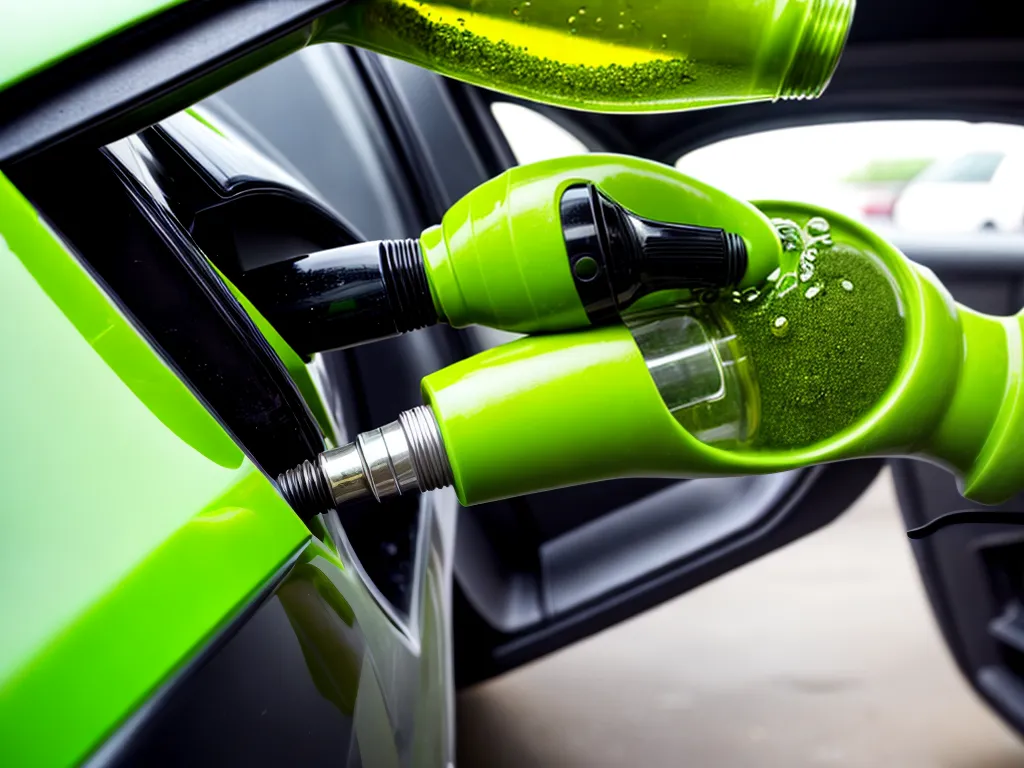
How to Use Biodiesel From Algae Oil To Power Your Car
Introduction
Converting my car to run on biodiesel from algae oil has been an exciting project for me. With rising gas prices and a desire to use more sustainable fuels, biodiesel is an attractive option. Algae oil in particular is a promising biodiesel feedstock that can be produced domestically and does not compete with food crops. In this article, I'll share my experience using algae biodiesel to fuel my personal vehicle.
Overview of Biodiesel
Biodiesel is a renewable fuel made from vegetable oils, animal fats, or recycled cooking oils. It can be used in diesel engines with little or no modifications. Biodiesel is biodegradable and cleaner burning than petroleum diesel.
The main way biodiesel is produced is through a process called transesterification. This involves chemically reacting the feedstock oil with an alcohol (usually methanol) in the presence of a catalyst like lye. The end result is biodiesel and glycerin as a byproduct.
Algae oil is one of the more promising feedstocks for biodiesel. Algae can produce oil rapidly and some strains contain very high oil content. Algae cultivation can utilize land and water resources not suitable for food production.
Choosing an Algae Oil Source
I researched different suppliers of algal oils and settled on a domestic producer of algae biodiesel from heterotrophic algae. This type of algae is grown in closed fermentation tanks and fed sugars. The benefit is it avoids competition for land and sunlight with crops.
The algae oil I selected contained over 40% triglycerides, which convert well to biodiesel. It also met quality standards for fuel grade biodiesel. Key factors I evaluated were:
- Domestic source
- High oil content strain
- Heterotrophic cultivation
- Pre-extracted algae oil
- Quality analysis for biodiesel production
This provided a reliable foundation for making my own algae biodiesel.
Producing Algae Biodiesel at Home
With the algae oil secured, I was ready to produce biodiesel in my garage. Homebrew biodiesel production is straightforward:
Supplies Needed
- Algae oil
- Methanol (reagent grade)
- Catalyst (NaOH or KOH)
- Reactor vessel with heating and mixing
- Separatory funnels and jars
- Safety equipment and PPE
Production Process
- Measure oil and methoxide (methanol + catalyst) at a 6:1 molar ratio
- Mix methoxide and add to oil in reactor
- Heat to 130-140°F and mix for 1-2 hours
- Allow to settle overnight and separate glycerin
- Wash biodiesel with water to remove impurities
- Dry biodiesel and test quality
This small-scale process produced 10 gallons of pure algae biodiesel. I also recycled the methanol and glycerin byproducts.
Running a Vehicle on Algae Biodiesel
With homemade algae biodiesel in hand, I was ready to convert my diesel pickup to run on this renewable fuel. Biodiesel can be used pure or blended with petrodiesel.
Vehicle Compatibility
Most diesel engines can run on biodiesel blends up to B20 (20% biodiesel) with no issues. Higher blends like B100 may require certain components to be biodiesel-compatible. Check engine manufacturer specifications.
I opted for B50 algae biodiesel blends to start. This allowed me to run primarily on biodiesel without modifications.
Performance and Maintenance
After transitioning to biodiesel, I found no discernible difference in performance. Horsepower, torque, and mileage were on par with petrodiesel. The engine ran smoothly with no issues.
The higher lubricity of biodiesel may help clean out deposits from petrodiesel use over time. More frequent oil changes are recommended when first switching. I also replaced rubber fuel lines and seals with viton compatible with biodiesel.
Overall, properly produced algae biodiesel provided a seamless transition as the primary fuel for my pickup.
Benefits and Challenges of Algae Biodiesel
Benefits
- Renewable and sustainable - Made from rapidly renewable algae oil
- Clean burning - Reduces emissions like particulate matter
- Domestically produced - Supports local economies and energy independence
- Performance - Provides equivalent power and mileage to diesel
- Uses existing engines - Requires little to no modification for most diesel vehicles
Challenges
- Higher cost than petrodiesel - But costs are decreasing over time
- Cold flow properties - Gelling in cold weather may require additives or blending
- Sourcing algae oil - Options are currently limited but expanding
- Homebrewing takes effort - Time and safety considerations for DIY fuel production
Conclusion
My experience using biodiesel from algal oil has been overwhelmingly positive. The process of homebrewing batch quantities was straightforward and yielded a high quality fuel. Using algae biodiesel in my pickup allowed me to dramatically reduce my petrodiesel consumption with no loss of performance.
As production scales up, I hope algae biodiesel becomes a mainstream option. Sourcing fuel from renewable sources grown locally in the US would be a big step towards energy independence and sustainability. I encourage other diesel vehicle owners to try out algae biodiesel as a green fuel option.